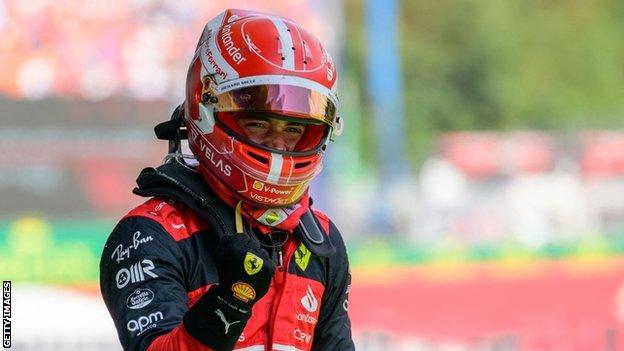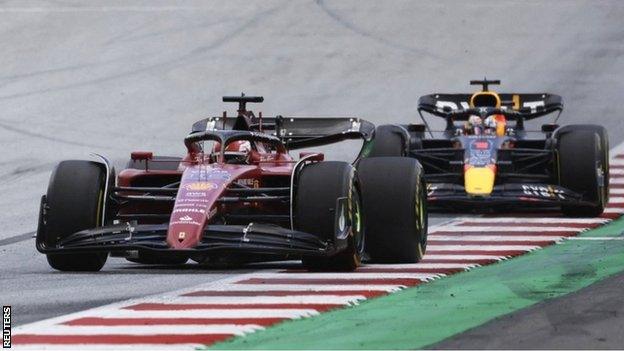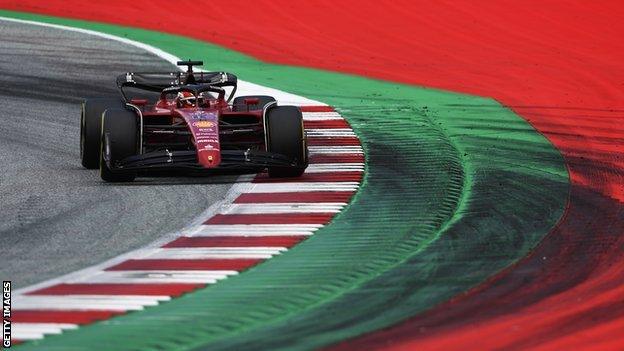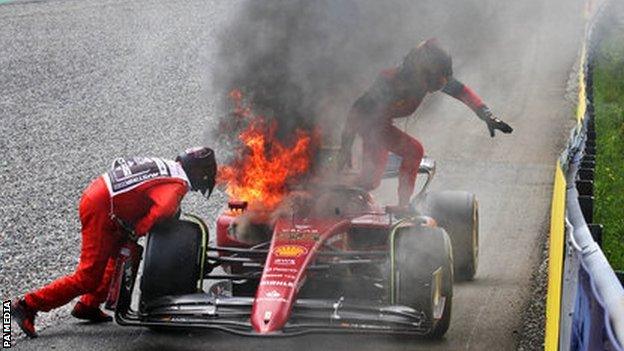Austrian Grand Prix: Clouds lift at Ferrari as Charles Leclerc claims statement win
- Published
- comments

Leclerc's third win of the season has reignited his championship hopes
The black cloud of misfortune that has been hanging over Charles Leclerc since early May finally lifted and he took advantage to make a powerful statement as he pulled off a dominant victory in the Austrian Grand Prix.
For five races, it was looking like this was just not going to be Leclerc's year, despite the blistering pace he has been showing in his Ferrari.
Four times in those five races, Leclerc lost a winning position through no fault of his own - two engine problems and two strategy mistakes, all while leading. The fifth of those races he started from the back of the grid as a result of those engine problems.
But in Austria it all came together and Leclerc produced one of the most convincing victories of the season. Look at what I can do with a clean run, he seemed to be saying.
Even this one was not without its anguish, though. A sticking throttle on the Ferrari allowed title rival Max Verstappen, who looked well beaten until then, to put Leclerc under pressure in the closing laps. But Leclerc held on to take his first win since Australia back in early April.
Afterwards his relief was palpable.
"I definitely needed it," he said. "Of course, when I got to a new race, since five races I have a smile on my face and I kept being optimistic.
"But hard race after hard race, it just felt like everything was against me. Finally we had a breakthrough good race today and it really feels good to win."
Verstappen has no answer to resurgent Ferraris

Leclerc passed Verstappen three times en route to victory
Grand prix victories don't come much more convincing than this one - especially against a rival as formidable as Verstappen and Red Bull.
Leclerc overtook Verstappen no less than three times on his way to victory as the Red Bull struggled with excessive tyre degradation and was forced into a sub-optimal strategy.
Leclerc's first passing move for the lead was a beauty - diving late but committed to the inside of Turn Four from quite some distance back, he seemed to catch Verstappen unawares.
Once the Ferrari was the lead, Red Bull threw the strategy dice, pitting Verstappen early for a new set of tyres and committing to a two-stop strategy in a race that, before it started, had looked to strategists on the cusp of that and a single stop.
Perhaps they hoped Ferrari would take the bait and try to cover Verstappen with at least one of their cars. But showing a composure and decisiveness that has not always been in evidence on the Ferrari pit wall, they stuck to their guns, left Leclerc and Carlos Sainz out and took control of the race.
As the laps ticked by, it was clear that Verstappen had no answer to the pace of the red cars. Leclerc also switched to a two-stop - but with much more conventional timings. And despite dropping behind Verstappen each time, Leclerc had no trouble closing in and repassing.
Sainz was about to do the same with 14 laps to go and make it the perfect day for Ferrari when his engine failed.
It was not only a reminder of the team's vulnerability - it was the third power-unit problem in six races for a Ferrari car - but also ensured Verstappen could minimise the damage. Elevated to second, and with fastest lap, in addition to victory in the sprint, he lost only five points to Leclerc over the weekend despite the Ferrari's superiority.
With a deficit reduced only to 38 points and half the season gone, Leclerc still has a mountain to climb. But the manner of this victory means that mountain does not look quite as insurmountable as it did just a week ago.
Ferrari pace no surprise to Leclerc

Leclerc's victory was his fifth in F1
The magnitude of the Ferrari's superiority around the Red Bull Ring caught everyone by surprise, especially Verstappen.
"I expected them to be strong but I didn't expect them to be this good," he said. "I think we were just a bit down on what we expected."
Leclerc, though, was quietly confident going into the race. He had been beaten to pole position by Verstappen and lost out in the sprint race on Saturday too. But he saw signs then of what might be possible.
Leclerc and Sainz had allowed Verstappen to get away in the opening laps of the sprint as they fought among themselves. But Leclerc closed in on the Red Bull towards the end and, after crossing the line, he told his team over the radio: "It's OK. We've got them tomorrow."
"I was quite confident," he said after his win on Sunday, explaining that comment. "The pace has been strong in the last five races. I had quite often said that on the Saturday night but not only to say it, I believed in it in all five races. It is good to finally show it on a Sunday and having a clean weekend.
"Speaking about yesterday, the pace was there and even though at the end of the sprint qualifying, it was difficult to know how much Max was pushing. I had a feeling we had a bit more the upper hand at the end of the sprint so that's why I was confident."
Verstappen's problem on Sunday was excessive tyre degradation.
"Just a lot of deg and I can't explain right now why it was so high because I think normally we are quite OK on the tyres," he said. "I expected it to be tough but not like this. But on an off-day or a bad day, to only lose five points over a weekend is good."
Ferrari had learned from the sprint. In the grand prix, there was no fighting between their drivers, although whether by accident or design was not clear.
Leclerc did not make as good a start, so did not attack Verstappen into the first corner, which in tandem with Verstappen's aggressive defence was what had brought Sainz into the picture in the sprint.
Instead, Sainz came under pressure from George Russell's Mercedes and ran wide at the first corner. Leclerc could therefore concentrate on staying within a second of Verstappen, so he had the advantage of the DRS overtaking aid as soon as it became available on lap two. He turned the screw tighter every lap, pressuring Verstappen harder and harder, and before long the lead was his and he took control of the race.
Ferrari team boss Mattia Binotto said: "In pure speed, we are very similar and qualifying proved it. I don't think there is much difference between the two cars. If anything, it was because of tyre degradation.
"In the sprint, I think we had a bit more advantage on tyre deg, which was even more evident today because we started putting pressure on Max at the very start and pushing him to have more pace and degrading more the tyres.
"I think what we saw yesterday in the sprint has been more obvious today because we put more pressure on him."
Ferrari are back - but did they ever really go away?
It was a mundane explanation for what is potentially a significant shift in the balance of the season.
Judged from the outside, this looked to be the first grand prix since Melbourne in which Ferrari have had a decisive pace advantage over a race distance compared to Red Bull.
It is, admittedly, not the easiest thing to judge. In Barcelona, Leclerc was leading convincingly before his engine failure, but had been only a couple of seconds ahead before Verstappen made a mistake and went off at Turn Four in the first stint.
The Ferrari was the quicker car in Monaco qualifying, but the wet early laps of the race and Ferrari's strategy errors made it difficult to judge comparative pace.
In Baku, Leclerc was again leading. But the team bought that lead with a gamble on an early stop under a safety car, and it was far from certain he was going to be able to hold off Verstappen on fresher tyres towards the end - indeed computer predictions suggested he would not have.
In Canada, where Leclerc started from the back, Sainz was on Verstappen's tail in the closing laps, but again there were tyre off-sets and safety cars involved.
Then in Silverstone, Verstappen had looked poised to take control of the race before running over debris and falling out of contention with a damaged car.
In Austria, though, there was no doubt - over a race, the Ferrari was conclusively the fastest car.
Leclerc said he "did not agree completely" with the analysis that this was the first time since Melbourne that Ferrari had been definitely quicker.
"I think Barcelona was one of those races where we were very strong," he said. "Monaco, we were very strong. But since those races, yeah, it was the first once where we were quite a bit quicker.
"It is not a surprise because we have been working very hard. But probably the surprise is coming from yesterday to today. Because yesterday Red Bull seemed to be very strong too, but today we seemed to pick up a bit more pace compared to them. It's a good surprise."
Sainz blow-up a reality check

Sainz's car expired in a fiery incident on lap 57
That's the positive for Ferrari. The negative was about reliability.
Sainz's retirement not only gifted Verstappen three points, but it may have ended his own hopes of going for the championship, which the Spaniard had expressed after taking his maiden victory at Silverstone. He is now 75 points behind Verstappen, almost certainly too far to consider overhauling.
"It looks to be the story of my season," Sainz said. "As soon as we get a bit of momentum, something goes wrong and it is difficult to continue with it."
For Ferrari, that might be a blessing in disguise in some ways - if they want to now back Leclerc as their main contender for the title, which they have resisted so far, they have a good reason to do so.
The bigger concern, though, is the durability of the engine.
As with Leclerc's Baku failure, Sainz is facing an imminent grid penalty for excessive engine usage, as he has already used his maximum allowance for the season. Although Binotto would not say on Sunday whether this will come at the next race in France.
Not only that, but both drivers face at least one more engine penalty beyond that because they will both need at least one further new engine to get them to the end of the season.
Binotto said: "We need to look into what happened today. Is it the same as the one in Baku with Charles? Very likely.
"It is certainly a concern, but the people back in Maranello are working very hard trying to fix them. We have new elements and I know how strong they are working and how good they are and I can count on them that it will be addressed as soon as possible. But it is not solved yet."

From Liverpool to the summit of international cocaine trade: Gangster: The Story of Curtis Warren
The story of one of the world's greatest rock bands: Celebrate The Rolling Stones as they turn 60

